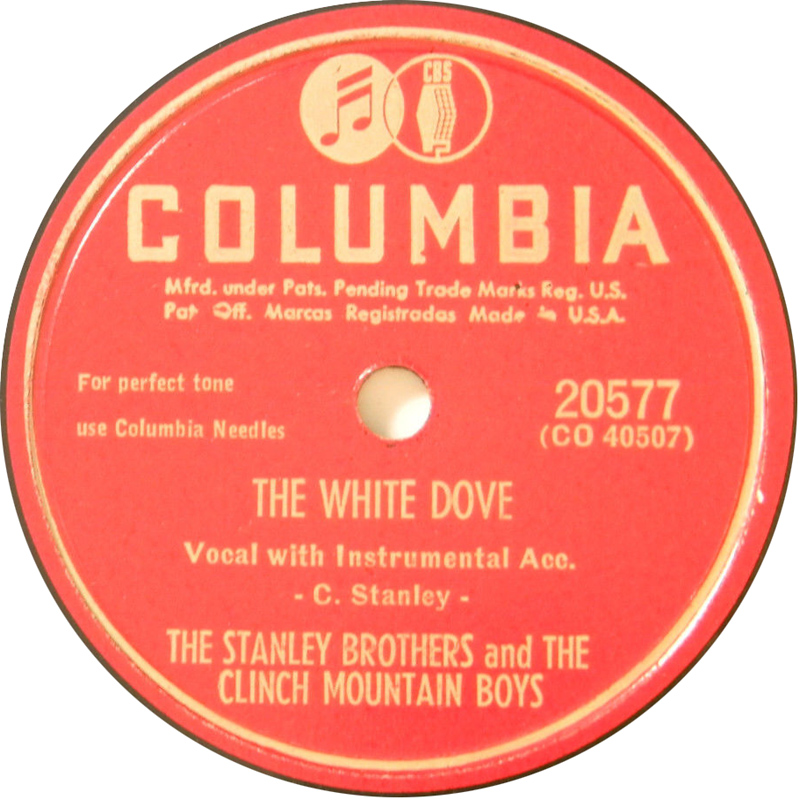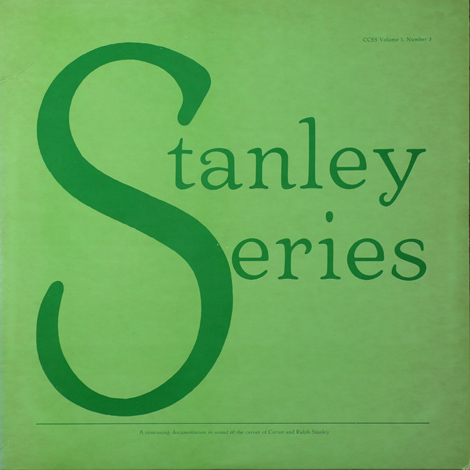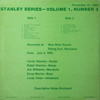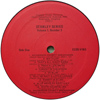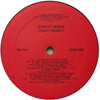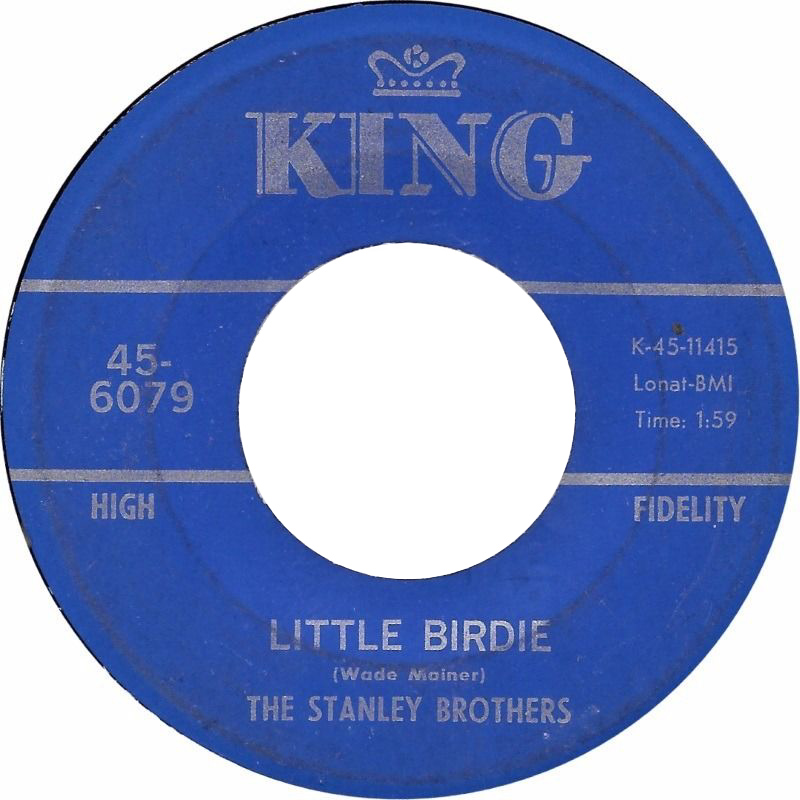- Bill Gatton Chevy Show
- Carter Stanley Interview - 1966
- Jim Kent's film 'Ralph Stanley's Bluegrass Festival'
- New WCYB Recording
- Pound Va. 1972 - Video
- Replica Rebel T-Shirt
- R.I.P. Ralph
- Roy Lee Centers Last Show
- Song & Memory Books
- Stanley Brothers - WCYB Acetate
- Stanley Standard - Carter Stanley Memorial Issue
- Suwannee River Jamboree
- Up In The Cloud - 1957-62
The Stanley Brothers - Stanley Series, Vol. 1 No. 3
(Copper Creek CCSS-V1N3) Dec 1982
The third edition of the 'Stanley Series' is from 3rd July 1955, New River Ranch, Rising Sun, Md. It's thought to be the earliest Stanley Brothers show to have been taped, and features Jim Williams on mandolin and Doug Morris on bass.
The show was one of the first to have been recorded by Mike Seeger, and although he was selective in what he taped, it still gives us a good idea of the Stanley Brothers, at the time when they were still signed to Mercury and Rock 'n' Roll was booming. Particularly suprising, to me, is the cover of That's All Right Mama - Elvis' first single, which is sung by Doug Morris. Also included is the Stanleys version of Blue Moon Of Kentucky, which Bill Monroe had persuaded them to record in Aug. 1954, and So Blue, which along with You'd Better Get Right had only recently been released on a Mercury single.
Lindy Clear gives a magnificent set of imitations on Model T., Frogs and Trains... He's also featured on some other shows playing bass too, but here he just does his imitation routine. I've often wondered whether his act was purely vocal, or if he carried out any actions, whilst winding the Model T. starting handle etc...
Needless to say, Carter and Ralph are on fine form, with sublime vocals on A Voice From On High, Angel Band and Will He Wait A Little Longer. Ralph also showcases two instrumentals, Hard Times and Big Tilda. At the time, Big Tilda hadn't yet been recorded.
The recording quality is pretty good considering the age and condition of the tape...
The LP comes with a 26-page booklet, giving background information and lyrics to the songs. Also featured is an article by Mike Seeger, which documents the circumstances around the recording and the Park Concerts like 'New River Ranch'. I've reproduced this in full below, because I think it's a useful piece both in describing the tape, but also the kind of gig which was fore-runner of the festival scene, and life-line to the Bluegrass bands at the time:-
"I first heard about the Stanley Brothers in 1952 or '53 when Dick Spottswood brought over a Rich-R-Tone 78, "Little Maggie" and "Little Glass Of Wine". I had been raised on old 78's and field recordings, and the sound of that record fit tight in with what I had already heard - that very soulful singing and fiddling and the raw driving banjo really got to me.
My folks had raised me to believe that folk music could change and always would and that it was good to catch it and record it whenever you can and try to encourage other people to like it and respect it. In late 1952, my father brought home a tape recorder, and I started my occasional tape documenting almost immediately by recording Elizabeth Cotten. Later, when I met Hazel Dickens and her brothers, Arnold, Robert, and Guy, in Baltimore in 1954, we started playing Blue Grass at parties.
It seems to me that the first time I saw the Stanley Brothers was in late '54 or early '55 at a big hall in Baltimore in a program with Clyde Moody (who had a trumpet player).
And then Hazel and her family told me of New River Ranch where all the Blue Grass musicians would come and play. So, we would go up there (a trip of about fifty miles) on a lot of weekends when we had the money or when I could get off from work, riding through those beautiful rolling hills of north Maryland and then turning off of Route 1 along a one-lane dirt road driving along the river to pay our one dollar or so and park up in the field and walk donw through the grove of trees to the stage. The general layout and feeling was very much like Bill Monroe's Bean Blossom Park in the early 1970's, plank seats on posts under trees, uncovered stage about four feet high with two minimal dressing rooms to the rear, a few concession stands (including in this case a fortune teller), a record stand, minimal food concessions and so forth. At New RIver Ranch there was a river just at the back of the stage that made it very damp and country feeling.
I always tried to get people from the city or the north to come to the New River Ranch and try to encourage more people to enjoy the music that I liked so much. I felt that we were experiencing, and I was documenting actually with the tape recorder, folk music in a transition point, and it really turned out to be that way. That was an exciting time for Blue Grass music development, and there were only a few bands active with very country roots developing a new style right there in the '50's. Also, when we went up to New River Ranch for the first time there was a certain magic to it because several of us had never seen the Stanley Brothers, just heard them on the records, and they were to us kind of like seeing a legend come alive.
To me the biggest diffrence between then and now is the sound system. In those days it consisted of one Shure PA mike, usually with a faulty connector, a too-small amplifier (tube, of course), and two public address horns in the trees. You could generally hear voice or lead instruments but the quality was somewhat like a telephone.
I would come in with my heavy tape recorder, ask permission to record from Alec Campbell and the artists who were playing there, and I would set up my one microphone on a tripod near as possible to the PA microphone with the recorder on one side of the stage. I would usually listen over the earphones since the quality was so much better. There was much curiosity about what I was doing as tape recorders were a new thing then, and I would often let people listen over the earphones to what I was recording. In the beginning, I was real selective, taking only what I considered the most important, and then I would take the tape home and listen to it over and over, and of course, I soon realised that I had been raised too Scotch. I missed some real good music and talk on those first shows, and with later shows I took most everything and more often recorded on a fast speed for better quality. This recording is only my second or third park recording, and I didn't keep the machine running enough.
The feeling was real loose and real country. Alex and Ola Belle would be the "home band" and would open with their old-time songs and a lot of joking - very loose, neighbourly, and entertaining and down-home. Then they would introduce the guest band, this day it was the Stanley Brothers and, believe, also Don Reno and Red Smiley. (Carter and Ralph were, I think, tuned one fret high, and Reno and Smiley tuned a little below standard I think. I feel they were sounding and presenting themselves as differently as possible.) The music would usually start around 1:00 PM with Alec and Ola Belle and then there would be a break and then another band and then another break and then another band, each group would play two or three times in the day on until 10:00 or 11:00 o'clock at night.
On this day, Carter and Ralph were extremely tired. My feeling was that they had driven all night, and nearly all Blue Grass musicians those days used regular six-passenger sedans to travel in.
The things that set the Stanleys apart was their soulful, close brother-mountain singing, and their ability to create new songs and instrumentals that were closely related to the old ones. They stayed in touch with the many country people who were making the transition to urban life but trying to maintain some of their old roots. Ralph's banjo playing was lightning fast and he had his own touch, and to set him apart from most of the banjo pickers of the time (and even up to this day) he also played several old-time styles. Carter's quality as a song writer and MC were equally important, and he was my favourite Blue Grass MC, always saying something about the music, something to the point, often humourous and personal - and always really communicating, never delivering pat lines repeated night after night. He helped educate me to Blue Grass music.
And, of course, both were excellent lead singers though of vastly different styles.
These tapes were recorded on a 1955 Magnecord M33 at 3 3/4 inches per second, half track, I'm sorry to say. The microphone was an omnidirectional Electrovoice number 635. The tape was poor to start with and so much of the magentic coating had come off by the time I copied it for this LP that the tape has a transparent stripe right down the middle of the entire tape. There are many dropouts. There are also several splices which you can hear. This is one of my favourite tapes and age has not been kind to it, but if you listen to the music instead of the techical problems it's as good and exciting as ever.
There is a funny thing that happened at this park show. I took my tape recorded home after it, and I noticed a day or two after it that there was a scratching noise going on in the tape recorder and it sounded like it was coming from the speaker. I took the front off the tape recorder and looked into the speaker and there was a praying mantis between the speaker and the the metal enclosure for the speaker and praying mantis had gotten in there at the park and had grown and couldn't get out. The animal is still in there to this day."
For more detailed breakdown and background to the show, check Gary B. Reid's The Music Of The Stanley Brothers book, pages 52-57 and 73-74.
- Carter Stanley: guitar, vocal
- Ralph Stanley: banjo, vocal
- Lindy Clear: imitations
- Doug Morris: bass
- Jim Williams: mandolin
NB: (*) Doug Morris sings lead on That's Alright Mama.
| Track: |
Title: |
Time: |
Date: |
Original Source: |
|||||||||||||||||
|---|---|---|---|---|---|---|---|---|---|---|---|---|---|---|---|---|---|---|---|---|---|
| A-1 |
Dickenson County Breakdown |
00:20 |
03 Jul 1955 |
New River Ranch, Rising Sun, Md. |
|||||||||||||||||
| R. Stanley |
|||||||||||||||||||||
| Gtr | Bjo | Mnd | Bs | Imitations | |||||||||||||||||
| Carter Stanley |
Ralph Stanley |
Jim Williams |
Doug Morris |
Lindy Clear |
|
||||||||||||||||
| A-2 |
Big Tilda |
01:09 |
03 Jul 1955 |
New River Ranch, Rising Sun, Md. |
|||||||||||||||||
| R. Stanley |
|||||||||||||||||||||
| Gtr | Bjo | Mnd | Bs | Imitations | |||||||||||||||||
| Carter Stanley |
Ralph Stanley |
Jim Williams |
Doug Morris |
Lindy Clear |
|
||||||||||||||||
| A-3 |
That's All Right Mama |
01:56 |
03 Jul 1955 |
New River Ranch, Rising Sun, Md. |
|||||||||||||||||
| Arthur Crudup |
|||||||||||||||||||||
| Gtr | Bjo | Vcl - Mnd | Bs | Imitations | |||||||||||||||||
| Carter Stanley |
Ralph Stanley |
Jim Williams |
Doug Morris |
Lindy Clear |
|
||||||||||||||||
| A-4 |
Poor Ellen Smith |
01:25 |
03 Jul 1955 |
New River Ranch, Rising Sun, Md. |
|||||||||||||||||
| P.D. |
|||||||||||||||||||||
| Gtr | Bjo | Mnd | Bs | Imitations | |||||||||||||||||
| Carter Stanley |
Ralph Stanley |
Jim Williams |
Doug Morris |
Lindy Clear |
|
||||||||||||||||
| A-5 |
Turkey In The Straw |
00:20 |
03 Jul 1955 |
New River Ranch, Rising Sun, Md. |
|||||||||||||||||
| P.D. |
|||||||||||||||||||||
| Gtr | Bjo | Mnd | Bs | Imitations | |||||||||||||||||
| Carter Stanley |
Ralph Stanley |
Jim Williams |
Doug Morris |
Lindy Clear |
|
||||||||||||||||
| A-6 |
So Blue |
02:18 |
03 Jul 1955 |
New River Ranch, Rising Sun, Md. |
|||||||||||||||||
| R. Stanley / Peggy Stanley |
|||||||||||||||||||||
| Gtr | Bjo | Mnd | Bs | Imitations | |||||||||||||||||
| Carter Stanley |
Ralph Stanley |
Jim Williams |
Doug Morris |
Lindy Clear |
|
||||||||||||||||
| A-7 |
Will He Wait A Little Longer |
02:04 |
03 Jul 1955 |
New River Ranch, Rising Sun, Md. |
|||||||||||||||||
| C. Stanley / R. Stanley |
|||||||||||||||||||||
| Gtr | Bjo | Mnd | Bs | Imitations | |||||||||||||||||
| Carter Stanley |
Ralph Stanley |
Jim Williams |
Doug Morris |
Lindy Clear |
|
||||||||||||||||
| A-8 |
Rabbit In A Log |
02:14 |
03 Jul 1955 |
New River Ranch, Rising Sun, Md. |
|||||||||||||||||
| P.D. |
|||||||||||||||||||||
| Gtr | Bjo | Mnd | Bs | Imitations | |||||||||||||||||
| Carter Stanley |
Ralph Stanley |
Jim Williams |
Doug Morris |
Lindy Clear |
|
||||||||||||||||
| A-9 |
Blue Moon Of Kentucky |
02:05 |
03 Jul 1955 |
New River Ranch, Rising Sun, Md. |
|||||||||||||||||
| Bill Monroe |
|||||||||||||||||||||
| Gtr | Bjo | Mnd | Bs | Imitations | |||||||||||||||||
| Carter Stanley |
Ralph Stanley |
Jim Williams |
Doug Morris |
Lindy Clear |
|
||||||||||||||||
| A-10 |
White House Blues |
01:32 |
03 Jul 1955 |
New River Ranch, Rising Sun, Md. |
|||||||||||||||||
| Wilbur Jones |
|||||||||||||||||||||
| Gtr | Bjo | Mnd | Bs | Imitations | |||||||||||||||||
| Carter Stanley |
Ralph Stanley |
Jim Williams |
Doug Morris |
Lindy Clear |
|
||||||||||||||||
| A-11 |
Dickenson County Breakdown |
00:10 |
03 Jul 1955 |
New River Ranch, Rising Sun, Md. |
|||||||||||||||||
| R. Stanley |
|||||||||||||||||||||
| Gtr | Bjo | Mnd | Bs | Imitations | |||||||||||||||||
| Carter Stanley |
Ralph Stanley |
Jim Williams |
Doug Morris |
Lindy Clear |
|
||||||||||||||||
| B-1 |
You'd Better Get Right |
02:03 |
03 Jul 1955 |
New River Ranch, Rising Sun, Md. |
|||||||||||||||||
| Bill Monroe |
|||||||||||||||||||||
| Gtr | Bjo | Mnd | Bs | Imitations | |||||||||||||||||
| Carter Stanley |
Ralph Stanley |
Jim Williams |
Doug Morris |
Lindy Clear |
|
||||||||||||||||
| B-2 |
Say You'll Take Me Back |
01:53 |
03 Jul 1955 |
New River Ranch, Rising Sun, Md. |
|||||||||||||||||
| R. Stanley |
|||||||||||||||||||||
| Gtr | Bjo | Mnd | Bs | Imitations | |||||||||||||||||
| Carter Stanley |
Ralph Stanley |
Jim Williams |
Doug Morris |
Lindy Clear |
|
||||||||||||||||
| B-3 |
A Voice From On High |
02:25 |
03 Jul 1955 |
New River Ranch, Rising Sun, Md. |
|||||||||||||||||
| Bill Monroe / Bessie Maudlin |
|||||||||||||||||||||
| Gtr | Bjo | Mnd | Bs | Imitations | |||||||||||||||||
| Carter Stanley |
Ralph Stanley |
Jim Williams |
Doug Morris |
Lindy Clear |
|
||||||||||||||||
| B-4 |
Angel Band |
02:42 |
03 Jul 1955 |
New River Ranch, Rising Sun, Md. |
|||||||||||||||||
| Jefferson Hascall / William B. Bradbury |
|||||||||||||||||||||
| Gtr | Bjo | Mnd | Bs | Imitations | |||||||||||||||||
| Carter Stanley |
Ralph Stanley |
Jim Williams |
Doug Morris |
Lindy Clear |
|
||||||||||||||||
| B-5 |
Wait A Little Longer Please Jesus |
02:26 |
03 Jul 1955 |
New River Ranch, Rising Sun, Md. |
|||||||||||||||||
| Hazel Houser / Chester Smith |
|||||||||||||||||||||
| Gtr | Bjo | Mnd | Bs | Imitations | |||||||||||||||||
| Carter Stanley |
Ralph Stanley |
Jim Williams |
Doug Morris |
Lindy Clear |
|
||||||||||||||||
| B-6 |
Model T, Frogs and Trains |
05:09 |
03 Jul 1955 |
New River Ranch, Rising Sun, Md. |
|||||||||||||||||
| N/A |
|||||||||||||||||||||
| Gtr | Bjo | Mnd | Bs | Imitations | |||||||||||||||||
| Carter Stanley |
Ralph Stanley |
Jim Williams |
Doug Morris |
Lindy Clear |
|
||||||||||||||||
| B-7 |
Hard Times |
01:32 |
03 Jul 1955 |
New River Ranch, Rising Sun, Md. |
|||||||||||||||||
| R. Stanley |
|||||||||||||||||||||
| Gtr | Bjo | Mnd | Bs | Imitations | |||||||||||||||||
| Carter Stanley |
Ralph Stanley |
Jim Williams |
Doug Morris |
Lindy Clear |
|
||||||||||||||||

